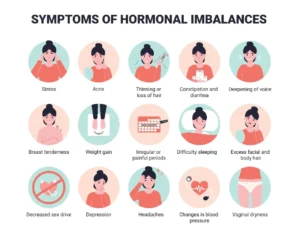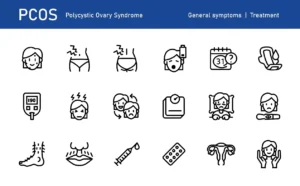Have you been feeling anxious lately? like everything is trying out your last nerve? Well, little do you know, your hormones could be acting up! Various factors such as stress, diet, and age can lead to hormonal imbalances, leading to changes in your body and behavior. Catching the early signs of hormonal imbalance can help nip this issue in the bud which in turn can help prevent some serious health issues.
In this article, we will discuss the causes of hormonal imbalances, their symptoms, health risks, and when to seek medical attention.
What Causes Hormonal Imbalance in Women?
Hormones are chemicals produced by the endocrine system, which includes glands like the thyroid, ovaries, and adrenal glands. These hormones help regulate processes like metabolism, menstrual cycles, and mood. When hormone levels are disrupted, your body’s balance is thrown off,
Common Causes of Hormonal Imbalance Include:
There can be various causes of hormonal imbalance, such as menopause, underlying health conditions, pregnancy, etc. We have discussed some of them below:
Menopause and Perimenopause:
As women approach menopause, estrogen and progesterone levels fluctuate which can present with various symptoms such as hot flashes and mood swings.
Polycystic Ovary Syndrome (PCOS):
It is a common condition where imbalances in reproductive hormones lead to irregular periods, weight gain, and infertility.
Thyroid Disorders:
Both hypothyroidism (underactive thyroid) and hyperthyroidism (overactive thyroid) can cause a range of issues from fatigue to weight changes.
Birth Control and Hormonal Medications:
Some contraceptives or hormone-based treatments can disrupt the body’s natural hormonal balance, which in turn can lead to heavy periods, excess pain, pain during sex, mood changes, and much more.
Stress, Lifestyle, and Diet:
Chronic stress increases cortisol levels, which can interfere with other hormones. Furthermore, poor diet and lack of physical activity can cause hormone imbalance.
Pregnancy and Postpartum Changes:
During and after pregnancy, hormone levels can fluctuate which leads to temporary or long-lasting symptoms.
Common Signs and Symptoms of Hormonal Imbalance
Recognizing the signs of hormonal imbalance early on can prevent more severe health issues from developing. Below are some of the most common symptoms women may experience:
Menstrual Irregularities
Hormonal imbalances can cause periods to become irregular, heavy, or even absent. You may notice longer or shorter cycles, or experience intense cramping and discomfort during your period.
Mood Swings and Anxiety
Unexplained mood changes, feelings of irritability, and anxiety are often linked to hormone fluctuations, especially during menstruation, pregnancy, or menopause.
Fatigue and Low Energy
Hormonal imbalances, particularly with thyroid or adrenal hormones can lead to constant tiredness. If you feel exhausted even though you are properly rested, it could be a sign of imbalance.
Weight Gain or Difficulty Losing Weight
Estrogen, cortisol, insulin, and thyroid hormones all affect metabolism. Any changes in these hormones can lead to weight gain or difficulty in losing weight. Sometimes this weight gain may be so stubborn that it doesn’t go down even with proper exercise and diet.
Hair Loss or Thinning
Thinning hair or excessive hair loss is often associated with conditions like PCOS, thyroid disorders, or menopause. However, some women may experience excess body hair, which is called hirsutism.
Acne and Skin Changes
Women may develop adult acne, particularly around the jawline and chin. Dry skin or other skin conditions can also be a sign of thyroid disorders.
Digestive Issues
Sometimes, it may present as bloating, indigestion, and changes in bowel habits, like constipation or diarrhea. This is especially common with conditions like hypothyroidism or elevated cortisol levels from stress.
Sleep Problems
Sleep disturbances such as insomnia or waking frequently at night are common symptoms of hormone imbalance. What’s ironic is that poor sleep can worsen hormonal imbalances which leads to a vicious cycle.
Reduced Libido
Studies have linked hormonal changes to changes in libido. Most of the time, these changes are due to changes in your estrogen and testosterone levels.
Hot Flashes and Night Sweats
Hot flashes and night sweats are very common during menopause or perimenopause however, they can also occur from fluctuations in your estrogen levels.
LongTerm Health Risks of Untreated Hormonal Imbalance
The symptoms of hormonal imbalance can be disruptive but, if left untreated, the long-term effects of hormonal issues can be more serious. Some of the potential health concerns include:
- Osteoporosis: Low estrogen levels during menopause can weaken bones, which makes them more susceptible to fractures.
- Infertility: Hormonal imbalances can interfere with ovulation and make it difficult for women to conceive.
- Cardiovascular Diseases: Changes in hormone levels can increase the risk of heart disease, especially in women going through menopause.
- Mental Health Issues: Continuous mood swings, depression, and anxiety are common with hormonal changes.
- Metabolic Disorders: Hormonal imbalances can lead to insulin resistance which can lead to an increased risk of developing type 2 diabetes.
When to See a Doctor
If you’re experiencing symptoms of hormonal imbalance, you should monitor your health closely. You should immediately see your doctor if you see these signs:
- Persistent fatigue or mood changes.
- Significant changes in your menstrual cycle.
- Rapid weight gain or loss.
- Symptoms of thyroid dysfunction (e.g., hair loss, cold intolerance).
Diagnosis and Treatment Options
Diagnosing hormonal imbalances often involves blood tests to measure blood hormone levels such as estrogen, progesterone, testosterone, and thyroid hormones. Common Treatment Options Include:
Hormone Replacement Therapy (HRT):
HRT is widely used for women going through menopause, It helps balance estrogen and progesterone levels to manage symptoms like hot flashes and mood swings.
Lifestyle Changes:
Sometimes, simple adjustments to diet, exercise, and stress management can restore balance. Regular physical activity and a balanced diet can be more beneficial than you think.
Medications or Supplements:
Your doctor may recommend medications or supplements depending on your specific condition.
Conclusion
Hormonal imbalances can affect both men and women at any stage of life and may cause a variety of symptoms. These conditions may be debilitating however, they are completely manageable. With hormonal replacement lifestyle changes and various medications, hormone imbalance can be corrected.
Nonetheless, it is not something to be taken lightly, and you should see your doctor if you notice any of the symptoms discussed above. Book your slot at the Frontline Healthcare Medical Clinic for a quick consultation now!!



